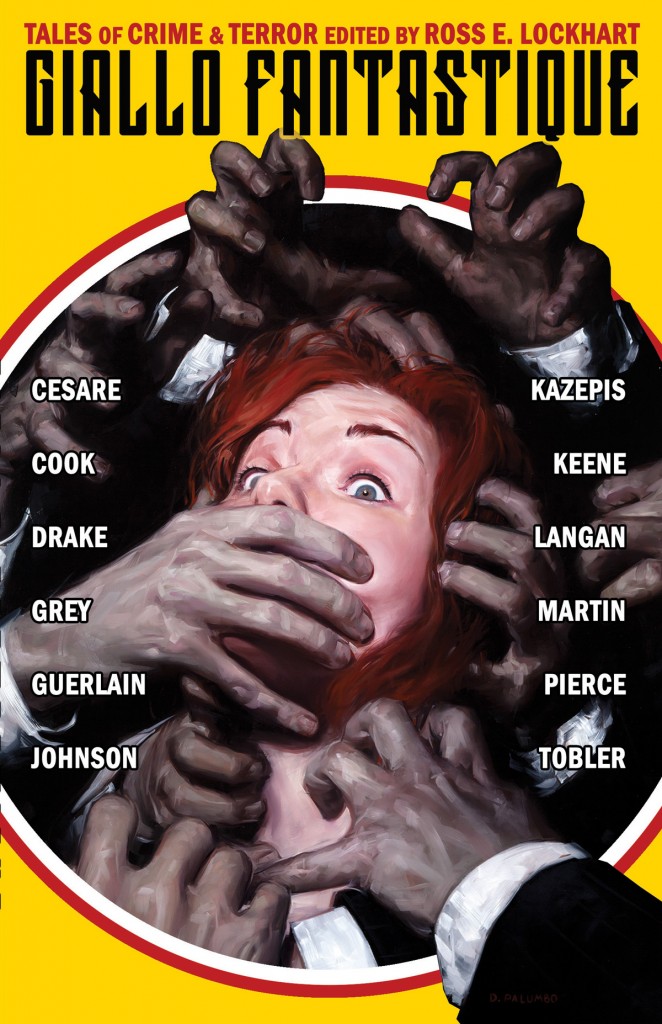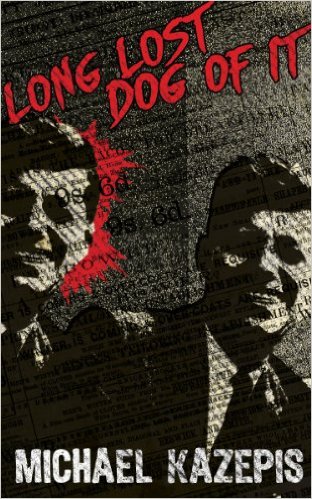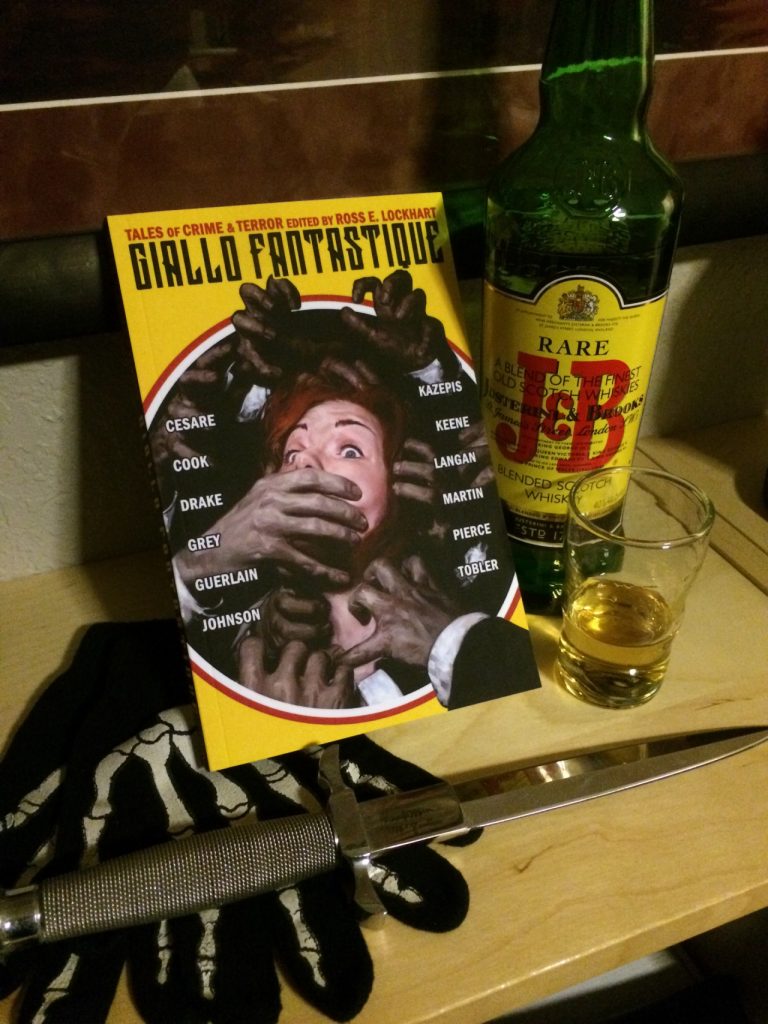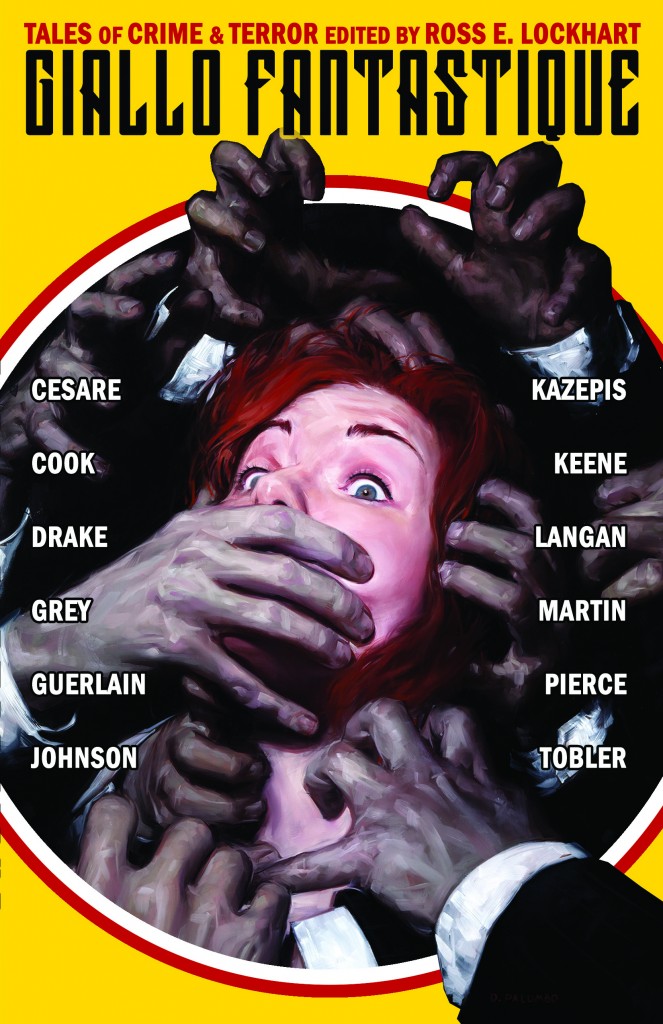Sean M. Thompson recently sat down with King Shot Press head honcho (and helluva writer) Michael Kazepis to ask him a few questions. Here are the results…
What do you think the role of genre is in fiction?
I’m not sure this is a question I can unpack in a way that doesn’t make me feel like a shithead. My view is, I guess, it’s a marketing tool that can become a cage. I’ll leave it at that.
Your story from Giallo Fantastique, “Minerva” is a traditional take on the Giallo genre. What inspired you to write the story?
Is it really a traditional take? I’m seeing this response enough to think I fucked up there—I kept trying to think of ideas reminiscent of giallo that weren’t going to feel like a retread. When Ross invited me to send him something, I was trying hard to figure out a recipe to fake my way in because I’ve always wanted to work with him, and you never know if that invitation comes around again. I mean, yes, I watched Deep Red to figure out some colors to write toward. But that was the extent of my research in the genre. Julio Cortazar’s “Blow-Up” gets riffed heavily. The character of Detective Halkias is a more serious take on Casey from Lloyd Kaufman’s Terror Firmer. I think the cinema sequence was informed by Godard’s Masculin, féminin—that Bergman “film within a film.” Lynch’s Mulholland Drive was also on my mind—I really like its Rubik’s Cube narrative. The Courier’s Tragedy, too. There are lots of scenes like this in literature and film, where the main character sees a performance and it echoes the main story in subtle ways. Here, I thought it’d be kinda funny to have the protagonist, Celia Marrast, watch a stylized snuff film about her brother. Something else is, I originally intended “Minerva” to be set in Rome, but I don’t really know much about Italian culture so I brought the story home to Athens. So that’s why the location is what it is. And you know, the more I think on this question, I guess there really is an overlap between what I did and what’s come before. The failure feels vaguely Borgesian to me. Like, I ended up rewriting Don Quixote word for word, and to me it reads like some other story. I think it took about seven months to walk away from it. I can be a very slow writer. Ross was extraordinary in his patience.

What themes do you find yourself coming back to in your work, if any?
Of what I’ve picked up? There are steady patterns of the unreliable witness, ruined cities, coping with parental death, amateur detectives, ghosts, godlessness, some leftist ideas. The struggle to sustain love, which is significantly more difficult than the pursuit of it. Life as a slasher film garnished with surrealism. I’ve been accused of writing all my lead characters as loners and I’ll cop to that.
Do you have any writing rituals?
It used to be that I’d take smoke breaks and long showers as ways of measuring space between writing scenes. I try not to smoke anymore. I don’t have the free time that I used to. Mostly it’s just sit and do this when I can. Coffee during the day. I’ll drink VISO at night because it’s less abrasive than coffee or an energy drink. Sometimes I’ll wake up at 3am and work when it’s quietest in the house. Today, I overslept and felt mostly unproductive. I’ve noticed that if I don’t regularly change up my diet, or where I’m working, I won’t get anything done. I get stir-crazy if everything’s continually the same. Almost four months ago, part of the middle finger of my right hand was crushed hydraulically and hasn’t healed yet—this week I was told the distal phalanx (or, fingertip, in doctor speak) doesn’t seem to be healing with the rest of the injury, so I’m presently hoping I won’t lose that part. I spent the first couple of months after the accident in a painkiller haze, and that’s set me back, in terms of schedule. Life is moving slower than I’d like it. So I haven’t had a consistent ritual in a while.
What’s your favorite Giallo film?
I haven’t watched enough of them to form an educated favorite. Recently, I liked Deep Red. As a teenager, I remember enjoying Suspiria, Tenebrae, other Argento stuff. I remember seeing a few films with David Hess in them, because I knew him from The Last House on the Left. Bava’s Bay of Blood, that.
Do you like the cold? Do you find your environment influences your writing, including the weather and the season?
I live in an old apartment that used to have baseboard heaters, but I tore them out because they smelled bad and never replaced them. I’ve got a portable radiator that I’ll occasionally plug in and that helps some. Usually I just layer up. I think some level of discomfort is essential for work to get done. Especially since it’s easier to be lazy this time of year. I find myself wanting to work from bed a lot, even knowing I’ll fall asleep. That’s a struggle because I’m already tired from working at my job and fixing things around the house. But as far as the weather goes, it’s not the being cold that bugs me, it’s the wind, when it can cut. That shit’ll split my knuckles in a day and draw blood. I end up hating the notion of going outside.

Do you have anything you’d like to tell our readers about? Special things?
There’s a novel I’ve been working on for a few years now called Nothing Crown, and it’s written like a post-apocalyptic road novel. It’s about a street kid that walks from Jerusalem to Paris to pursue rapping. Think something akin to Children of Men meets, like, Illmatic (Nas) . . . in the Levant.
I also run King Shot Press, which is a post-bizarro publisher of radical fiction. Last year, we released some really great books by Cody Goodfellow, Eric Nelson and Chris Lambert. This year, KSP is releasing Lambert’s sophomore novel, Killer Unconquered, the second part of a bigger novel-in-series. Violet LeVoit, who won the Wonderland Book Award back in November, has her debut novel coming up, I Miss The World, a Nicholson Baker-esque novel that follows two siblings through the Hollywood Forever Cemetery. November was very surprising in that Scott Nicolay, whose forthcoming book Noctuidae is part of the next batch of KSP titles, took home the World Fantasy Award the same weekend that Violet nabbed the Wonderland. His book’s about a hike through an Arizona canyon that leaves two people stranded with something very big. Lastly, there’s Troy James Weaver’s Marigold, in which a 30-something floral salesman searches for reasons to keep living.
Thanks, man.
Thank you.




